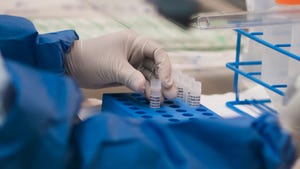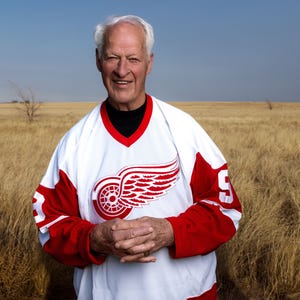There is nothing in here that would prove that stem cell treatment caused these gains. Wishful thinking in my opinion, cause and effect has not been proven.
http://www.usatoday.com/story/sports/2015/07/22/bart-starr-improving-after-stem-cell-treatment/30540473/
Bart Starr had quite a meal Tuesday morning in Alabama — three pancakes and an omelet with three eggs and cheese.
It was made by his wife Cherry, his bride of 61 years. And it didn’t take him long to eat it.
“He fed himself the entire breakfast,” Cherry Starr said. “It was great.”
It was another small but significant moment for Starr, the legendary former Green Bay Packers
quarterback. Before he underwent an experimental stem cell treatment in
June, Starr, 81, could barely walk or feed himself. His condition had
deteriorated after suffering a heart attack, two strokes and a four
seizures in September.
But now he can walk and eat unaided, seemingly sparked back to his feet with the help of this treatment.
“It’s
just been really exciting to witness,” Cherry Starr told USA TODAY
Sports. “Some of it might have been natural. It might have happened
without the stem cells to some degree. But there’s no question that has
absolutely helped him, and some of his cognition has improved rather
dramatically really. He can do things like tie his shoes. He’s feeding
himself. He can read. I could go on and on about a lot of things that
we’re witnessing that are really, really exciting to us.”
She said Starr received an infusion of 90 million stem cells in June, when he traveled to the San Diego area
for treatment. During the trip, they also met with two other sports
heroes who previously received similar treatments: hockey great Gordie Howe, 87, and former San Francisco 49ers quarterback John Brodie, 79.
It
was quite a moment — three iconic former athletes disabled by strokes
but brought together by their faith in an experimental new medicine that
has not yet been approved for widespread use in the U.S.
Brodie
and Starr both were NFL MVPs and had competed against each other as
recently as 1970, when Brodie led the 49ers over Starr and the Packers
26-10. Starr received his stem cell treatment the same week Howe had
returned to the area for a second round of a similar treatment.
“We
had a good visit when (Starr) and Gordie were here, and John was chief
of enthusiasm,” John’s wife Sue Brodie told USA TODAY Sports. “I think
it rubbed off on Bart, as he now has a personal trainer and has had
numerous improvements. He realized that he can get better. That is the
key also. He is being treated like an athlete and not a patient. Very
important for these guys.”
Both Brodie and Howe received stem cell treatments at a clinic in nearby Tijuana, Mexico.
Cherry Starr said she agreed not to talk about the companies and
location involved in her husband’s treatment until a later time. But she
described a treatment pattern similar to Brodie’s and Howe’s.
She
said Bart Starr is returning to the San Diego area for more stem cells
in September, this time to receive stem cells that are believed to help
the brain. Similarly, Brodie and Howe received two separate injections
of two different types of stem cells — mesenchymal stem cells derived
from the bone marrow of an adult donor, and neural stem cells, derived
from a single donated fetus. Those stem cells were manufactured by
Stemedica, a company in San Diego, which didn’t return a message seeking
comment about Starr.
Such a two-cell treatment is not yet
available in U.S. clinical trials, but a spokesman for Stemedica
previously told USA TODAY Sports that the company soon would apply to
begin one in the U.S. In the meantime, its products have been tested in
foreign clinical trials, including at a licensed clinic in Tijuana,
where it’s less expensive to conduct.
“I think people have a
strong and legitimate interest in what’s happening with stem cells, and
I’ll be glad when this country will permit stem cells for the brain,”
Cherry Starr said. “You shouldn’t be forced to go out of the country to
receive this help.”
Experts caution that this is unproven medicine
and that natural healing and physical therapy also can cause improved
conditions. That’s why it’s being tested in clinical trials — to
determine if it’s safe and effective. Experts also generally caution
against getting unproven medicine in foreign countries because they
don't have the same safety and efficacy standards as the U.S. Food and
Drug Administration (FDA).
"It is understandable that patients and
families facing major health issues such as strokes are looking for
hope from stem cells, and I wish them the best," said Paul Knoepfler, a
biomedical scientist and associate professor at the University of
California, Davis. "At the same time, there is little if any evidence
that these kinds of non-FDA approved treatments actually work and are
safe."
On the other hand, some families just don’t feel like they have other options after a loved one suffers a debilitating stroke.
“Honestly
this (condition) is the just the most undignified thing that can happen
to a person,” Cherry Starr said. “It totally robs a man or a lady of
their dignity.”
Cherry
Starr said her husband wasn’t expected to live much longer after
suffering his strokes, a sequence that started with a rare complaint of a
headache. About three weeks after returning from San Diego in June, she
said they started noticing significant improvements.
“This last week, he’s been walking all by himself,” she said. “It’s been pretty amazing.”
Starr spoke briefly in a video that aired in Green Bay Saturday honoring Brett Favre, another legendary quarterback who was joining him in the Packers Hall of Fame.
“Four
weeks ago, he could not have done this,” Cherry Starr said. “He was
able to read the teleprompter, and that was just amazing to me.”
His son, Bart Jr., spoke at the ceremony and said his father “had begun turning the corner in a significant way.”
Cherry
Starr declined to say what the procedure cost. “It is an expensive
procedure — that I will say,” she said. “And I’ll be glad when it’s more
affordable for more people.”
She said the family has hired a
therapist to work with him and is anxious for their upcoming return to
the San Diego area. The two are high school sweethearts from Sidney Lanier High School in Montgomery, Ala.
“I just want a better quality of life for him, and I’ll do anything to make that happen,” she said.
Use the labels in the right column to find what you want. Or you can go thru them one by one, there are only 32,440 posts. Searching is done in the search box in upper left corner. I blog on anything to do with stroke. DO NOT DO ANYTHING SUGGESTED HERE AS I AM NOT MEDICALLY TRAINED, YOUR DOCTOR IS, LISTEN TO THEM. BUT I BET THEY DON'T KNOW HOW TO GET YOU 100% RECOVERED. I DON'T EITHER BUT HAVE PLENTY OF QUESTIONS FOR YOUR DOCTOR TO ANSWER.
Changing stroke rehab and research worldwide now.Time is Brain! trillions and trillions of neurons that DIE each day because there are NO effective hyperacute therapies besides tPA(only 12% effective). I have 523 posts on hyperacute therapy, enough for researchers to spend decades proving them out. These are my personal ideas and blog on stroke rehabilitation and stroke research. Do not attempt any of these without checking with your medical provider. Unless you join me in agitating, when you need these therapies they won't be there.
What this blog is for:
My blog is not to help survivors recover, it is to have the 10 million yearly stroke survivors light fires underneath their doctors, stroke hospitals and stroke researchers to get stroke solved. 100% recovery. The stroke medical world is completely failing at that goal, they don't even have it as a goal. Shortly after getting out of the hospital and getting NO information on the process or protocols of stroke rehabilitation and recovery I started searching on the internet and found that no other survivor received useful information. This is an attempt to cover all stroke rehabilitation information that should be readily available to survivors so they can talk with informed knowledge to their medical staff. It lays out what needs to be done to get stroke survivors closer to 100% recovery. It's quite disgusting that this information is not available from every stroke association and doctors group.
Subscribe to:
Post Comments (Atom)


HE CAN TIE HIS SHOES!!
ReplyDeleteSo what, doesn't prove a damn thing about stem cells.
DeleteTrue. But if I had made little progress doing what I'm doing, then had a startling improvement after some unproven treatment, it's anecdotal evidence, but doesn't mean you shouldn't give it a go.
DeleteBefore commenting, I want to disclose that my firm, Soter Healthcare, works with people from around the world who deal with challenging medical conditions, including stroke. We work with three hospitals in our international hospital network that do outstanding work with stroke patients, including two that utilize stem cell therapy as part of the treatment program.
ReplyDeleteThe two hospitals that include stem cell therapy in their treatment programs have treated more than 800 stroke patients. More than 80% of those patients have made significant, demonstrable physical and cognitive gains following treatment. The results include enhanced balance, movement, strength and endurance; cognitive gains, including reduced aphasia, better recall, and clarity; improved speech clarity; reduced spasticity, improved flexibility, and enhanced fine motor skills; and improved neural capacity, among others. The treatment program integrates stem cells with other medical techniques and intensive physical therapy.
There are three problems with this work that lead people to dismiss it:
First, it is performed outside the US. Those of us of a certain age, however, recall the first heart transplant was done in South Africa, not the US. Vision correction procedures were first successfully performed in Russia, not the US, and laser vision procedures were available in Canada well before they were approved by the FDA. There is excellent medical care and research being performed in other parts of the world. Ignoring it serves only to limit the options available for people who could benefit.
Second, the hospitals that are performing this work are not conforming to the FDA's clinical trial model. The primary distinction is that there is often no control group. The researchers and medical providers abroad operate from a perspective that it is broadly understood what happens when nothing is done for stroke patients and focus on what results from treatment.
Third, there are some places that claim to perform stem cell procedures that are more hype than reality. I agree this serves to confuse people. It is hard to discern who the good providers are and who isn't. It's dangerous to pick the wrong folks. We get that one.
I'm pleased to see that Mssrs. Starr, Howe, and Brodie are regaining their health. I do attribute some of that recovery to regenerative medicine, although, like others, I'm too far away from the specifics of their cases to know specifically what to link with stem cell benefits. I have some concerns about the methods, source of cells and communications used by the company that provided their care. I've commented on it elsewhere, so I won't repeat it here for the sake of time and brevity.
Regenerative medicine is in its infancy. It is, however, here and serving the needs of people seeking recovery following stroke effectively.